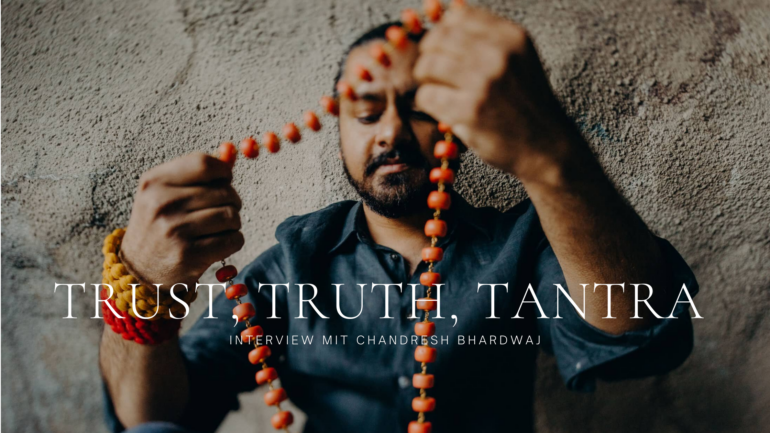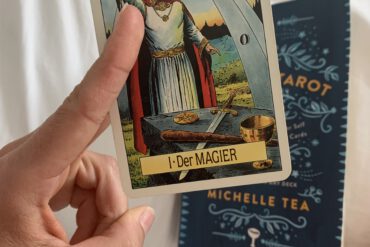Wer den Filmklassiker Forrest Gump gesehen hat, erinnert sich vielleicht an die Stelle, an der Forrest erzählt: „Mama hat immer gesagt Wunder geschehen an jedem Tag. Es gibt Leute, die glauben nicht daran, aber es ist so.“. Mir wird immer ganz warm, wenn ich daran denke und deshalb nutze ich das Zitat, um euch von einem kleinen Wunder zu erzählen, das mir persönlich vor nicht allzu langer Zeit widerfahren ist. Das Wunder, als sich mir – ganz beiläufig – die Welt des Tantras eröffnet hat.
Wer jetzt an zwielichtige Massagestudios und akrobatische Sexpraktiken denkt, der kennt leider nur die Marketingmaschinerie des Westens, die dieser altehrwürdigen vedischen Wissenschaft keinesfalls gerecht wird – ganz im Gegenteil sogar. Im Tantra versteht man die gesamte menschliche Erfahrung als weder gut noch schlecht und, ja, auch Themen wie Sexualität gehören zum Spektrum unseres Menschseins dazu. Aber statt wie in manchen spirituellen Lehren Gefühle zu unterdrücken, werden sie im Tantra bewusst erfahren, kanalisiert und in eine höhere Bewusstseinsebene transzendiert. Mit Orgien und Promiskuität hat das aber nichts zu tun, denn wer sich seiner selbst bewusst ist (Tantra ist im Grunde genommen eine Wissenschaft der self-realization, for the lack of a better German word), der würde wahrscheinlich solch eine Richtung nicht einschlagen. Aber dazu später mehr. Eröffnet hat diese Welt für mich Chandresh Bhardwaj. Ich bin auf sein Buch „Break The Norms – Question Everything You Think You Know About God And Truth, Life And Death, Love And Sex“ gestoßen und fing, voller Neugierde, direkt an seinen Podcast „Break The Norms“ zu hören. Ganz viele Fragezeichen in meiner spirituellen Praxis verschwanden nach und nach und plötzlich legte sich mir der rote Faden all meiner bisherigen Erfahrungen dar. Es war, als hätte meine Seele einen sanften Kuss auf den Nacken bekommen, eine Umarmung und ein „alles ist gut“ für den weiteren Weg dazu.
Chandresh ist Sohn eines indischen Tantra Lehrers in 7. Generation, daher könnte man meinen, dass ihm Spiritualität in die Wiege gelegt worden ist. Tatsächlich hat sein Umfeld stark auf ihn abgefärbt und er interessierte sich bereits als kleiner Junge für Meditation und die Mystik. Doch sein Vater, der gleichzeitig sein Guru (spiritueller Lehrer) geworden ist, hat es ihm nicht leicht gemacht oder ihm gar einen Weg vorgegeben. Ganz im Gegenteil, er sollte erst seine eigenen Erfahrungen machen und eine gewisse Reife und Einsicht erlangen, bis sein Vater Shri Chamunda Swami ihn als Schüler offiziell angenommen hat und mit ihm sein erstes Mantra teilte. Mantren sind in der Tantra Tradition extrem kraftvolle Mittel, welche in die Meditationspraxis integriert werden. Sie wirken ähnlich wie ein Samen, den man pflanz und aus dem später etwas wachsen soll. Sie sollten nicht leichtsinnig eingesetzt werden, da sie teilweise sehr starke Auswirkungen haben können und man zunächst bereit sein muss, um diese überhaupt ‚handeln‘ zu können. Abgesehen von dem spirituellen Umfeld, in dem Chandresh aufgewachsen ist, prägte ihn auch die Zeit als Heranwachsender. Obwohl er ein sehr guter Schüler war, fühlte er sich nicht als Teil des Mainstreams. Das merkt man noch heute, er hat ein Herz für die ‚Misfits‘ und ‚Conscious Rebells‘, wie er sie nennt. Die Notizen für sein erstes Buch schrieb er schon als Jugendlicher und veröffentliche es dann Anfang 20 mit dem Titel „Break the Norms“ – ein kleiner Rebell im Herzen eben. Dort schreibt er wortwörtlich über Gott und die Welt: von Spiritualität, über das stark kontroverse Thema Ego aber auch über Liebe und Sex (wie anfangs gesagt, das Thema, was wohl leider die meisten heutzutage mit Tantra assoziieren). Ich habe in dem Buch nahezu auf jeder Seite den Textmarker angesetzt. Kein rosa Wellness Mainstream mit good vibes only, sondern die volle human experience – mit allen Schatten und Tabuthemen. Es wundert mich nicht, warum das Vorwort zu seinem Buch vom Dalai Lama höchst persönlich verfasst wurde. Wenn ich das Buch mit einem Wort zusammenfassen müsste, dann wäre es „Wahrheit“. Nämlich unsere eigene Wahrheit zu all diesen Themen zu finden, zu spüren und zu leben – nicht die gegebene Vorstellung von außen zu übernehmen. Genau das ist mein Herzensthema, das mich mehr oder weniger bewusst seit meiner Jugend begleitet. Ich habe mich schon als Kind als das hässliche Entlein gefühlt, für das es im großen Teich einfach keinen Platz gibt. Verunsichert und von meiner Wahrheit immer weiter entfernt, folgte ich schließlich dem Pfad, den andere als richtig für mich empfohlen haben – kein Wunder, ich wollte schließlich von „den Enten“ akzeptiert & geliebt werden. Doch glücklicherweise wird uns das Universum nicht einfach gegen die Wand fahren lassen – wenn wir anfangen zuzuhören. Wie das vermeintliche Entlein die Schwäne entdeckt hat, bevor es sein eigenes Spiegelbild im Wasser erblickte (und letztendlich verstand, dass er gar keine Ente war), so fühlte ich mich am Beginn meiner Reise zu meiner eigenen Wahrheit. Und Chandresh ist in meiner kleinen Geschichte der Schwan, der mir freundlich den Weg zu den anderen weist.
Sein liebevolles, warmes Wesen voller Weisheit und Mitgefühl hat mich tief in seinen Bann gezogen und ich fing an, wie ein trockener Schwamm, alle seine Worte in seinem Podcast „Break the Norms“ (jetzt: Leela Gurukul) in mich aufzusaugen. Seine Lehre von Tantra entsprach dem, was ich mir unter Spiritualität vorstellte und inspiriert mich seitdem jeden Tag aufs Neue in die Tiefe zu gehen und mir bewusst Zeit für meine Praxis zu nehmen. Es erfüllt mich mit einer ungetrübten, kindlichen Freude ein Interview mit ihm zu teilen, in dem ich ihn alle Fragen stellte, die mir während des Zuhörens und Lesen einfielen und hoffe sehr, dass euch seine Worte ebenso inspirieren und empowern wie mich.
Interview (ENG)
Chandresh, I have already introduced you as the author of “Break the Norms” and as the Tantra expert, you are. Today you are working with clients across the world as a spiritual teacher & healer, and you started your own spiritual school called Leela Gurukul this year (2021). But before all this, you went to business school in New York and worked on Wall Street – what a contrast. Considering that you’re coming from a traditional guru lineage, it almost seems like a rebellious act to choose a corporate path. How would you describe your journey so far?
So, my journey so far has been a mix of all the seasons. There are pleasant seasons; there are seasons of a thunderstorm, there are hibernation seasons, there are all kinds of seasons. Hopefully, my journey has been to learn the play of these Seasons and show up in my absolute awareness for these seasons so far.
And one thing I would say here is that my act of choosing a corporate path was not at all rebellious. I think it was an act of fair insecurity and doubt. Maybe leaving the corporate and coming back to spirituality could have been a rebellious act to some extent. But I would say even that was not rebellious to me, as it was more of a question of surviving. I just couldn’t even breathe in the Wall Street jungle. So, for me to breathe and bloom, I knew that I needed to leave finance world. So, it was really the pursuit of finding that space, that strength and meaning of my existence. The journey so far has been filled with all the darkness, light, and everything in between. And I think I wouldn’t want to change any of that.
Your father, His Holiness Shree Chamunda Swami, is a popular & highly respected guru – quite a legacy to live up to, isn’t it? How do you navigate all the expectations, and what are the main differences between you as a teacher/healer and him?
So, this has been a huge legacy to live up to, and navigating the expectations was never ever an easy path. Maybe that’s why subconsciously, I did certain things. I remember my father telling me this early on, that the students of his Guru never accepted my father as the real deal. They would always say, “you’ll never be as good as your guru”
I clearly saw that my father is absolutely unique and different as a teacher than his Guru. I needed to have that courage to realize that the teachers I love (including my father) are beautiful because they are just who they are. So, I had to make a conscious effort to live up to let go of all these Expectations. To do that, I started nurturing my version of spirituality. It was messy, rough, unclear, filled with doubts, but I knew that I needed to navigate through that messi-ness to find who I am.
Next step was to leave New York where I started practicing my spiritual work first. I started doing events and talks in absolutely different spaces, different countries, different communities, and it was all experiments to understand whether I even deserve to be here or not. So, this is how the expectations slowly faded away from me.
I am too small speck of a dust to compare or watch the difference between me and him as a healer. I have been practicing full time as a healer for around 12 years while has has been doing it for more than 40 years now. One of the striking differences I see is that I am very inclined toward taboos, human darkness, and unconventional patterns in spirituality. But his inclination is more toward family-oriented work and lesser toward taboos.
The new generation of seekers is – as it seems on social media – really consumed by the topic of the spiritual awakening and hence being “woke”. How do you define it and was there a particular moment in your life, when you had an awakening, or was it a process?
I didn’t have any particular moment. But maybe series of many moments that added to the overall experience in my spiritual realizations.
Those moments were sometimes all light-filled and sometimes all-dark. I am glad they became such an anchor for me to go deeper into my Sadhana, and they started opening up my mind. I feel being woke is is like cooking fresh food daily. You have to prepare it daily. Being woke isn’t a frozen food that you can store and use for years.
I feel that in Germany, most people are unfamiliar with the science of Tantra; even in the Yoga community, there are many different myths and beliefs around that. We all know what most people think of first; I was very baffled how many “Tantra Massage Studios” exist around me. Could you briefly describe what the primordial teachings of Tantra really are about, so we are all on the same page?
Tantra is defined as a science of self-awareness. Tantra will invite you to indulge in life with complete awareness. It will invite you to understand and transcend your ego, greed, anger, and desire’s attachment on a root level. Tantra also is one of the unique schools where the Divine Feminine is honored and loved on a deeper level. This Divine Feminine is filled with strength, fierceness, care, nurturing. A certain aspect of tantra is toward transcending sexual energy, but people misuse and indulge in it unconsciously. It’s complex topic to talk about in a brief interview here but I have recorded plenty of episodes on my podcast, leela gurukul, to reflect more on the abuse and misuse of tantra teachings.
What do you aspire to achieve through Tantra? Is there any ultimate goal that you’re working towards?
If you had asked this question 10 years ago, I would have mentioned many goals that I was Aspiring to work toward. But if you ask me today, there is no goal that I am working toward in Tantra. Because Tantra itself does not encourage a life filled with goals. Tantra encourages us to embrace Leela, the playfulness in life. And Tantra says life does not have a purpose; it does not have a goal. Life in itself is the purpose. So, when you show up for it, life will bloom and expand its organic way. So, for many years (for more than 10 years, I guess), my daily conscious effort is to show up for the Tantra work. To show up for that Tantra energy, and when I am able to show up for it when I am able to contribute to it, I feel I have contributed a little bit to the world, the bigger picture of Tantra.
From your own experience, is it possible to “read” somebody’s Chakras? If yes, how do you get there?
It’s possible to read Chakra or energy. And anybody can get there, but you have to be empty. We are filled with so much ego, so much of our complications in mind, so many stories, so many thoughts, so many judgments. So, they will always restrict us from reading somebody’s Chakra or even energy. You need to have this absolute unconditional compassion to read somebody’s Chakra. You can polish this ability with meditation, mantras, and above all, the guidance of a Guru.
I recently saw an advertisement in my Yoga studio for a “Tantric Hatha Vinyasa” workshop. I remember you described Yoga and Tantra as two different paths leading to the same destination. So, does Tantric Yoga even exist?
Tantric Yoga exists. It is the science of Tantra that practices yoga in alignment with Tantra beautifully well. But the problem is; currently, everybody is trying too hard to brand Tantra or Yoga or Tantra Yoga. The authentic teachings exist but marketing noise is changing things for all.
I am extremely curious about Tantra, to say the least, and I am sure many of my readers will be as well. I am aware that in this tradition, you learn from a guru, and its mysteries are not written down anywhere like an Ikea construction manual. Especially the topic of the goddesses and their energies are intriguing me, but I feel so humbled by all the information out there, and I don’t really know where to start educating myself. What approach would you recommend if we can’t find a Tantra teacher (or Guru)?
Tantra teachers are tough to find and also Tantric students are tough to find. There are students who join it but soon they get bored because Tantra is not a weekend course and most of the students want a quick weekend certificate. Or, they want a yearlong 300-hour certificate course. But tantra wants your entire life in devotion.
So, if you don’t have the tantra teacher, I would recommend that you start studying the Shiva teachings; you start studying the teachings of the Goddesses also known as Dus Mahavidya. And start building a disciplined meditation practice. This is a good prerequisite for tantra. Do not do this with a goal or agenda that is going to make an expert in Tantra.
You may start from Shiva and move into the work of Devi or Goddesses. And from that, finally building a daily discipline practice that starts from 10 minutes and increases it to a one-hour minimum. And you will notice that it’s going to open up a new world. Tantra teachings will unfold most organically for you.
This year, you founded Leela Gurukul – a modern spiritual school. How did this idea come to fruition, and what is your mission & vision for the future?
This was an idea that was always there. When I moved from India to the USA, I realized that real spiritual school is missing, even in India and in the USA. There are certain schools in India, and they are called Ashram. But they are still functioning on traditional wisdom- guidance-models. And they are great for certain kinds of people. But for people like me, I realized that there is no school for someone like me who wants a certain kind of Tantra experience but wants to be here, not moving to an Ashram. I realized that the Tantra had not been repurposed for the modern seekers. And we need to have a specific school that could really teach the curious seekers about the right way of Tantra and the right way of spirituality.
Also, I have learned and absorbed so much from my Guru, and I needed a space to share his teachings. I realized that I could not do that on social media or on the podcast. I need a well-defined structured platform. That’s how Leela Gurukul was born. I’ve waited almost ten years to open it because I wanted to do it my way and not feel any pressure from social media or the marketing noise. So, I am happy that I am doing it my way now.
The vision or mission for Leela is straightforward. I hope I can invite the conscious seekers, the curious seekers. I hope it becomes the place where every curious speaker finds a home. That is my only vision with it. I hope to continue to understand the curiosity of seekers and provide a platform for them.
With my blog – Czary – I wanted to share my journey to peace & purpose and all the magic in between. Peace comes relatively quickly with practice. Through meditation, I’m currently only tapping into my purpose energy (if you can call it that way). I know many like-minded seekers who are also stuck discovering their purpose (or Dharma) because life is very demanding, and somebody’s got to pay the bills. How do we manage the balancing act between finding our purpose and making a living?
So, like I said, in Tantra, we don’t define life as something where it needs to have a purpose. But life does not have a purpose; life is a purpose. So many people interfere in that purpose, and I get into the stressful, endless cycle of making a living. They invite anger, anxiety, stress, physical illnesses, and mental illnesses only because everything is messed up on a fundamental level now.
So, I recommend building a relationship with your awareness through meditation. Once the meditation is there, then you can start inviting courage, calmness, and clarity. I pretty much-invited gratitude and trust. Gratitude for the gifts you have. You may not even see them as gifts, but they are gifts to many people. They are helping many people to achieve their peace, their harmony. So first of all, I would recommend that you start meditating, invite gratitude, and just find out your gifts. And then invite the trust. Trust to move ahead, to speak your truth, to live your truth. A trust to move ahead with all that’s waiting to unfold within you. And finally, courage to live your truth. Courage to be out there. So, I guess, the answer to this question is to maintain the balance, invite gratitude, courage, and trust. Do it consistently, and you will find your gifts, and you have to share them now.
You said that you practice Yoga (referring to the eight limbs like Yamas, Niyamas, etc.) with the exception of Asana. Can you share why?
There is no spiritual reason for this. There is so much one wants to do, and my highest priority is always to train and polish the Tantra healer in me because this is how I can help others. Most of my daily time, energy, and space go to practicing Tantra rituals and Sadhna. For the rest of the time, I do not skip my daily walks or running. So, all the time in energy goes into that, and very little time is left. I don’t practice the eight Limbs of Yoga on that intense level. But I do take the guidance on and off. If you ask me what exactly do I take from Yoga? It’s the Yoga Pranayama that’s something I try to practice as much as I can.
Who is Chandresh when he is not teaching or practicing? You said that you love poetry & movies – let us know what activities make you lose track of time and what you do when you’re off the “meditation cushion” 😉
I love reading and writing poetry. When I am writing poetry, I lose track of time. I don’t watch movies in one go though. I will watch movies in installments. I could finish watching a movie in one month. I’ll watch 10-20 minutes, and then I will stop. This is how I read the books also. My favorite books are the ones that I read over the months. So, I will watch a movie for 10 minutes, then pause it. I’ll read two pages and then pause it. Then I’ll come back to them, next day, maybe next week, or maybe next month.
But if you ask me who am I when I am not teaching or practicing? I am indulging in poetry; I am indulging in nature. I love spending time around nature. I love walking or driving to unknown places, even in my city, without a navigational drive somewhere. And I’ll trust wherever it’s taking me. I wouldn’t say I like socializing so much, so I try to avoid that. But being in nature, being in poetry, honoring my solitude, and just self-reflection. I can be alone for 100 years and not be bothered. I love that aloneness. I don’t need to do a lot to fill that space. Because so much of my time is spent teaching and practicing. So whatever time is left, I like to be in total solitude.
Your grandfather gifted you a very special book at your birth. Could you share a little bit about it and try to describe its magic?
Yes, that book has been absolutely a gift. It’s a gift because it’s written about me. And, it was written by someone so extraordinary. He is our lineage Guru. He is the Guru who trained my Guru. He was the bridge between our ancestors and us. What a blessing, what a fortunate moment to have a book written by him about me. It’s actually sitting right in front of me. It’s magical. It’s a blessing. It’s beautiful. I open it on and off, and I need to feel its energy. So, the book is all about my spiritual journey. He has pretty much explained and written a lot of specific details. As straightforward as that, I will leave India at the age of 19 and settle in some different country. And that’s exactly how it happened. He has also written that I will study accounts and finance, but I will not have a job, and no one should force me for it. So, you can understand things that are written so precisely that I almost avoid reading them now. Because when I read it, I want to manifest greatness very severely, and I get scared when something negative is written.
For example, it was written that I would be a short-tempered person, and I would need to have some emotional management. So, it used to scare me because I knew my anger was just not good. But the book helped me to understand that this could be a big loophole. So, I put on conscious efforts in understanding and managing my emotional energy.
Lastly, I would love to know your favorite book, quote & movie. Thank you!
In books, I love The Prophet by Gibran. (Anmerkung: Hier findest Du die Deutsche Version “Der Prophet”)
Among the movies, I love Guide and Black from Indian cinema. And Parasite and The Revenant among the others.
Here’s a quote by my favorite J. Krishnamurti that I continue to meditate on:
“It is no measure of health to be well adjusted to a profoundly sick society.”
Chandresh’s Webseite: cbmeditates.com
Leela Gurukul: leelagurukul.com
Chandresh’s Instagram: instagram.com/cbmeditates/
Leela Gurukul auf Instagram: www.instagram.com/leelagurukul/





